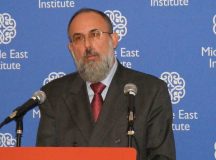Yesh Atid leader Yair Lapid’s recent 6,000-word essay set out a centrist vision of Israel’s future and warned of the danger of the country becoming an ‘illiberal democracy’. The writer Yossi Klein Halevi praised it as ‘the most memorable political essay that I’ve seen from any Israeli politician’. Paul Gross, whose own earlier essay on ‘Liberal Nationalism’ was cited favourably by Lapid, argues that by making his central thesis that Israeli democracy is in trouble, Lapid has placed himself at the head of the battle to save it.
Yair Lapid’s essay appeared first in Hebrew at a time when there was still the possibility of him being a leading figure in a new Israeli government. A matter of days later, his partner at the top of the Blue and White Party, Benny Gantz, shocked even long-time observers of the topsy-turvy world of Israeli politics and left Lapid in order to negotiate a ‘unity government’ with Benjamin Netanyahu, taking half of the party’s Knesset members with him.
So, instead of being a signpost to the ideological direction of a new government, this unusually detailed statement of a senior politician’s worldview became the opening shot in what the now-Opposition Leader will treat as a three or four year election campaign (the proposed tenure of the pending Netanyahu-Gantz government).
The essay is unusual firstly because ideology has featured so little in Israeli politics in recent times. For many years the ideological gap between the two principal camps was crystal clear. There was the traditional left-right split on the economy, and then, following the Six-Day War (and especially as the Palestinian question began to dominate political debate in the 1980s and the First Intifada was followed by the Oslo Peace Process) a no less distinct split separated the left, favoring land-for-peace, from the right, who to varying degrees opposed territorial concessions.
Today there is little appetite for a return to the socialism of the state’s first few decades (though plenty of criticism at the rise in inequality). Meanwhile, in recent years a weary consensus has descended on the majority of Israelis regarding the conflict with the Palestinians; most of those who would ultimately like to see a two-state solution see no real partner to such an arrangement on the Palestinian side and so essentially concur with two-state opponents that ‘solving the conflict’ is not feasible in the near-to-medium term. It has been a non-issue for the past few elections.
Recent elections (and there have been a lot of them!) have been fought primarily over personalities. The last three elections specifically, held over a politically chaotic 11-month period, were first-and-foremost referenda on Netanyahu’s suitability and legitimacy to continue as prime minister.
The Centrist Persuasion
Lapid’s lengthy exposition of his guiding principles is a welcome reminder that ideas should matter in politics.
The Israeli-American writer Yossi Klein Halevi spoke recently in praise of Lapid’s essay, intimating precisely this: ‘here was somebody, for the first time, really articulating this political moment through a very clear ideological centrist lens. It was the most memorable political essay that I’ve seen from any Israeli politician.’
Halevi also refers to the other unusual element of the piece: this renewed ideological vigour is coming from neither left nor right, but from the self-defined ‘centre’. Since entering politics with his brand-new party Yesh Atid (‘There is a future’) in 2012, Lapid has adamantly rejected the labels ‘centre-left’ or ‘centre-right’, insisting there is a defined centrist politics, and it is genuinely neither left nor right.
It is by no means the first centrist party in Israel’s history. There have been many, all defunct within two or three Knesset terms. This is true of even the most successful ‘centre party’ of all, Kadima, established by prime minister Ariel Sharon in the wake of the disengagement from Gaza in 2005. With a majority of his Likud party opposed to the disengagement he needed an alternative vehicle with which to run for prime minister in the pending elections – and to further his agenda of continuing what he started with Gaza, pursuing a policy of unilateral withdrawal from territory claimed by the Palestinians. Sharon brought with him to Kadima not only fellow Likudniks, but a number of senior figures from the Labour Party, including the veteran Shimon Peres. Kadima was set up as a single-issue party; the issue was the conflict, and Sharon had determined that the left’s analysis of the need to separate from the Palestinians and end Israel’s rule over them was correct, but so was the right’s distrust of the Palestinian leadership. The solution was therefore for Israel to decide on its own what its borders should be and withdraw to those lines, evacuating settlements that would no longer be in Israeli-controlled territory.
Kadima was very deliberately triangulating between the traditional Labour and Likud positions. (Ultimately, Sharon’s successor as Kadima leader and as prime minister Ehud Olmert, moved towards a more traditional leftist position of negotiation with the Palestinian leadership as unilateralism had been discredited by Hamas’s takeover of Gaza and Hezbollah provoking the Second Lebanon War from its state-within-a-state in southern Lebanon – an area Israel withdrew from unilaterally in 2000). Winning 29 and 28 seats in its first two elections, Kadima had collapsed to two seats by election number three, following its entry into a so-called national unity government with Benjamin Netanyahu’s Likud, and today exists only as a historic anomaly – the only party from outside the Labour/Likud duopoly to lead a government.
Lapid’s centrism differs from Kadima’s in two important ways. Firstly, he fundamentally rejects the idea that the centre is simply a spot roughly equidistant between left and right: ‘the center is not one spot on the scale – it is a movement’ he wrote. ‘In this political moment, centrism is the unequivocal decision of my companions and I to refuse to concede ground to the complexity of our Jewish and democratic state and of our national and liberal identity. Our basic principle is that politics does not take place away from the context of people’s lives, but as part of it.’
His essay presents a sensibility or persuasion rather than an ideology. The centrist persuasion rises to meet the challenge of the day, eschewing the dogmas of left and right and responding to the lived reality of people. His embrace of what I termed ‘inclusive nationalism’ in an essay that he cites, is a case in point. His centrism balances a recognition of the real need for identity and rootedness that nationalism offers, and an appreciation that liberal democracy can also bind a nation together: ‘Democracy is the bedrock of solidarity among the constituent sectors of our nation… Democracy not only provides them with their rights, but also the recognition that they share those rights with others.’
His willingness to so openly endorse the language of national identity (and to criticise the universalism of the left – ‘Theirs is a lofty philosophical aspiration; however it comes as no surprise that it does not withstand an encounter with political reality.’) helps explain why, despite his obvious antipathy towards what is today the Israeli right, he is also very much not part of the left.
Democracy is now the issue
The second important departure from Kadima’s centrism is that the political goalposts have shifted. Today’s ‘political moment’ calls for a focus not on peace, but on democracy. And thanks to Lapid, the democracy-camp is being led not by the left – as the peace camp always was – but by the centre.
Lapid makes no bones about the scale of the threat posed by the Netanyahu-led right. His essay places it in the international context of illiberal parties and leaders gaining power and prominence but he makes the important point that, in Israel, the move away from liberal democracy was not the result of a change of leadership or the emergence of a new party: ‘Instead of the liberal party being overtaken by a nationalist rival, the liberal party itself simply metamorphosed into a nationalist party. And it was Netanyahu who stood at the forefront of this transformation.’
As Lapid explains at great length and with a compelling logic, Netanyahu has been moving Israel inexorably away from the norms of liberal democracy, threatening to join a growing list of what Hungarian prime minister Viktor Orban proudly calls ‘illiberal democracies’; countries where the facade of democracy remains, but liberal principles like the rule of law, freedom of speech and minority rights have been systematically curtailed.
Lapid describes Netanyahu solidifying an alliance with both the ultra-Orthodox and the religious settler leadership, both of whom (for different ideological reasons) endorse the implementation of ‘restrictions on the country’s democratic character in order to entrench its Jewish essence … We must abandon the tiresome balancing act between Judaism and democracy, Netanyahu told his voters’. Lapid uses a quote from the veteran settler leader Benny Katzover to hammer home his point: ‘Israeli democracy has run its course; it must be dismantled and made to bend the knee to Judaism.’ The language is radical but actually, this view can today be found throughout the mainstream Israeli right, including among secular ideologues such as Yariv Levin, one of Netanyahu’s closest allies in the Likud, or Ayelet Shaked of the settler-led Yamina party.
Shaked and Levin were the central players behind the controversial Nation-State Law, passed last year as a new Basic Law (a quasi-constitutional law in Israel’s system, in the absence of codified constitution). For both, this law is intended to replace Israel’s non-legally binding Declaration of Independence as the definitive definition of Israel as a Jewish state. Unlike the Declaration, the Nation-State Law pointedly makes no reference to essential liberal values such as equality or civil rights (the Declaration states: ‘[Israel] will ensure complete equality of social and political rights to all its inhabitants irrespective of religion, race or sex; it will guarantee freedom of religion, conscience, language, education and culture …’)
Israel is not a Hungary, where courts have been packed with judges loyal to the regime and journalists critical of the government have been fined financial penalties or fired; but the Likud and its allies have long planned to prevent the Supreme Court from acting as a check on executive power (the so-called ‘’Override Law’), and demonisation of the mainstream media has become a feature of Netanyahu election campaigns. It is not for nothing that Robert Kagan, one of America’s foremost scholars of global politics, a man with no record of anti-Israel animus, warned in a high-profile op-ed last year that Israel has started marching to the new illiberal tune sounding out from Budapest, Warsaw and elsewhere. It is not for nothing that a senior aide to Orban said recently that his boss and Netanyahu ‘belong to the same political family’.
Kagan’s piece was slammed by a number of respondents in the Israeli and American-Jewish press but it is hard to argue with his central thesis that Israeli democracy is in trouble, and Lapid has placed himself at the head of the battle to save it.
Lapid’s Long Road and the Founders’ Promise
Yair Lapid deserves more credit than he gets for building a truly national party from scratch, with branches and activists across the country, consistently more diverse in its parliamentary representation than any other in the Knesset. In his first election, it won more seats than any party save Netanyahu’s Likud. In his second, it dropped by some 50 percent (not incidentally, as a result of Labour moving towards the centre under Isaac Herzog), but it confounded the lamentable history of previous centre parties by growing in strength, with Yesh Atid second behind Likud in opinion polls even before the alliance with Benny Gantz, which led them to parity with Netanyahu’s party.
With the ultimately rollercoaster alliance with Gantz now over, Lapid faces a period as Opposition Leader, in which he has to present himself as an alternative prime minister and his ideas as the blueprint for an alternative government. Gantz may become prime minister in 18 months’ time, but Lapid still has the opportunity to make the greater mark on his country’s political history. The former’s decision to join Netanyahu returned his erstwhile deputy to the forefront of the battle over Israel’s future character. As he says at the end of this potentially pivotal essay, ‘There is a long road ahead.’ Indeed there is. But the destination is nothing less than the liberal democratic Jewish state that our founders promised us.




































Sadly, Israel is no longer a democracy. One cynical and unscrupulous man has taken a hostile control of the country’s media and all key positions of power, and has been attacking and destroying democracy, the judiciary and
law enforcement. He placed himself above the rule of law and governs as one man’s dictatorship. The silence from world Jewry is deafening.